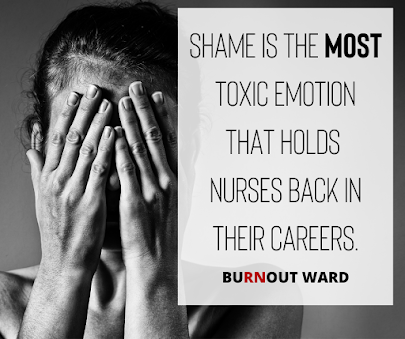Shame is the most toxic emotion that holds nurses back in their careers.
Shame because you were fired, let go, or turned down for a dream position.
Shame because you are behind in your career.
Shame because you compare yourself to others and regret the decisions you have made.
Shame completely derails so many nurse's careers.
Mostly because of the fear of being judged, being told you are wrong, or not good enough to get the things you want.
Shame keeps so many amazingly talented nurses hiding on the sidelines, waiting for someone to 'Hey, you are good enough to finally have that thing you want.'
I get what it is like to feel shame about your nursing career. And I understand how it feels to think you are not good enough and that something must be wrong with you. I used to hide and talk myself out of the things I wanted because of it.
So if you are wondering how to do that, here are my four tools that I use to stop shame from controlling my career and my life.
1. Understand shame is only a feeling it cannot hurt you.
Feeling shame can't hurt you.
It is just an emotion that, while it feels VERY uncomfortable, IT CANNOT HURT YOU.
The only way shame can hurt you is if you allow it to fester or dictate entirely what you do and how you show up.
Which brings me to my following tool.
2. Allow the feeling of shame without judgment.
My brain loves to remind me of how I am not good enough and every flipping mistake I have ever made (especially right before I go to bed and I have an early morning).
Instead of fighting it or pushing it away, I allow myself just to feel it without making it mean something is wrong or bad about me.
By doing this, I help desensitize myself to the emotion and stop trying to avoid it.
Because I know when I am resisting, it just comes back strong and more intense.
3. Lean into the feeling of shame and meet it with self-compassion.
When my brain starts pointing out everything I do wrong, every way I humiliated myself or wasn't good enough, I stop myself. Instead of letting myself go down the path of beating myself up, I will talk to this part of myself like it is a child.
For example, if I think about a time where I give critical feedback or made a mistake. I will tell myself things like: "Yes, that happened, and I am still a good person who works very hard every day." or "Yes, that happened, and here are all the other examples of how I did something perfectly."
This approach serves two purposes. First, it helps me stop the spiral of shame. Second, it resets my brain to remember all the ways I am good enough and deserve my own forgiveness.
4. Normalize it.
This is the final tool and can be really uncomfortable for people. As Brene Brown says, shame derives its power from being unspeakable.
This is why a considerable part of the work I do with my clients is helping them normalize the shame they experience in their nursing careers.
It can be uncomfortable, but cleaning it out is necessary for healing, just like any infected wound.
In closing, shame is not something we are born with. We are taught to keep us in line with familial, cultural, and societal norms.
And unfortunately, shaming is a tool that is used a lot within nursing to get other nurses to "fall in line."
But if you use these four tools above, you can break that cycle and take back the narrative from yourself and anything you have done that causes you shame.
If you want to stop letting shame sabotage your career, you have to be willing to share it. Let's chat because I want to see you get what you want out of your nursing career.

Comments
Post a Comment